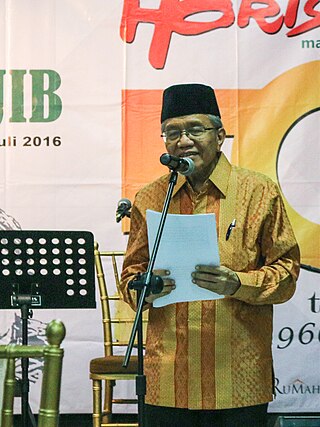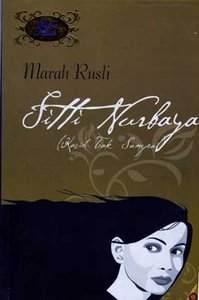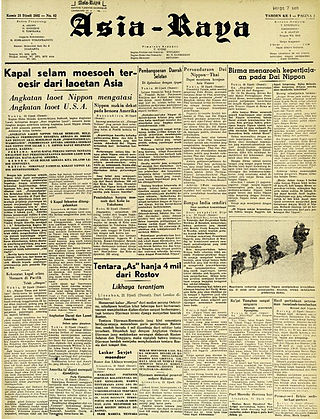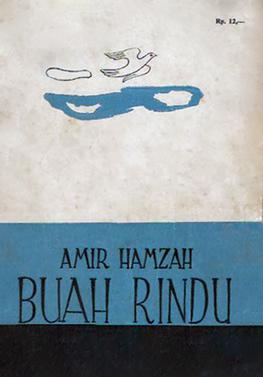
"Aku" (meaning "Me") is a 1943 Indonesian-language poem by Chairil Anwar. It reflects his individualistic nature and vitality.

"Aku" (meaning "Me") is a 1943 Indonesian-language poem by Chairil Anwar. It reflects his individualistic nature and vitality.
Kalau sampai waktuku | If my time has come |
Anwar first read "Aku" at the Jakarta Cultural Centre in July 1943. [1] It was then printed in Pemandangan under the title "Semangat" ("Spirit"); according to Indonesian literary documentarian HB Jassin, this was to avoid censorship and to better promote the nascent independence movement. [2] "Aku" has gone on to become Anwar's most celebrated poem. [3]
Indonesian writer Muhammad Balfas notes that one of Anwar's contemporaries, Bung Usman, wrote "Hendak Jadi Orang Besar???" ("So You Want to Be a Big Person???") in response to "Aku". [4] Balfas suggests that Usman was greatly irritated by the "vitality and new way of life" that Anwar showed in the poem. [4]

According to Timorese scholar of Indonesian literature A. G. Hadzarmawit Netti, the title "Aku" emphasizes Anwar's individualistic nature, while the temporary title "Semangat" reflects his vitality. [5] Netti analyzes the poem itself as reflecting Anwar's need to control his environment and not be shaped by outside forces, emphasizing the first two stanzas. [5] According to Netti, through controlling his environment, Anwar is able to better protect his freedom and individualistic nature. [6] Netti sees the final line as reflecting Anwar's pride in his individualistic nature, finally surmising that Anwar would have agreed with Ayn Rand's philosophy of Objectivism. [7]
Indonesian literary scholar Arief Budiman notes that "Aku" reflects Anwar's worldview, that others should not care for him as he does not care for others. [8] Budiman also notes that the third and fourth stanzas reflect Friedrich Nietzsche's view that suffering makes one stronger. [9]

Chairil Anwar was an Indonesian poet and member of the "1945 Generation" of writers. He is estimated to have written 96 works, including 70 individual poems.

Indonesian literature is a term grouping various genres of South-East Asian literature.

Taufiq Ismail is an Indonesian poet, activist and the editor of the monthly literary magazine Horison. Ismail figured prominently in Indonesian literature of the post-Sukarno period and is considered one of the pioneers of the "Generation of '66". He completed his education at the University of Indonesia. Before becoming active as a writer, he taught at the Institut Pertanian Bogor. In 1963, he signed the "Cultural Manifesto" as a document that opposed linking art to politics. This cost him his teaching position at the Institut.

Sitor Situmorang was an Indonesian poet, essayist and writer of short stories. Situmorang was born in Harianboho, North Sumatra, and educated in Jakarta. He worked as a journalist and literary critic in Medan, Yogyakarta and Jakarta for a variety of newspapers and periodicals.

Sitti Nurbaya: Kasih Tak Sampai is an Indonesian novel by Marah Rusli. It was published by Balai Pustaka, the state-owned publisher and literary bureau of the Dutch East Indies, in 1922. The author was influenced by the cultures of the west Sumatran Minangkabau and the Dutch colonials, who had controlled Indonesia in various forms since the 17th century. Another influence may have been a negative experience within the author's family; after he had chosen a Sundanese woman to be his wife, Rusli's family brought him back to Padang and forced him to marry a Minangkabau woman chosen for him.

Toeti Heraty was an Indonesian poet. She has been singled out as the "only woman amongst the leading contemporary Indonesian poets".

Tengku Amir Hamzah was an Indonesian poet and National Hero of Indonesia. Born into a Malay aristocratic family in the Sultanate of Langkat in North Sumatra, he was educated in both Sumatra and Java. While attending senior high school in Surakarta around 1930, Amir became involved with the nationalist movement and fell in love with a Javanese schoolmate, Ilik Sundari. Even after Amir continued his studies in legal school in Batavia the two remained close, only separating in 1937 when Amir was recalled to Sumatra to marry the sultan's daughter and take on responsibilities of the court. Though unhappy with his marriage, he fulfilled his courtly duties. After Indonesia proclaimed its independence in 1945, he served as the government's representative in Langkat. The following year he was killed in a social revolution led by the PESINDO, and buried in a mass grave.

Poedjangga Baroe was an Indonesian avant-garde literary magazine published from July 1933 to February 1942. It was founded by Armijn Pane, Amir Hamzah, and Sutan Takdir Alisjahbana.

Sanusi Pane was an Indonesian writer, journalist, and historian. He was highly active in literary media, sitting on the editorial boards of several publications. He has also been described as the most important dramatist from before the Indonesian National Revolution.

Atheis is a 1949 Indonesian novel written by Achdiat Karta Mihardja and published by Balai Pustaka. The novel, using three narrative voices, details the rise and fall of Hasan, a young Muslim who is raised to be religious but winds up doubting his faith after dealings with his Marxist–Leninist childhood friend and an anarcho-nihilist writer.

Muhammad Salim Balfas, better known as M. Balfas, was an Indonesian writer and literary critic.

Asia Raya was a newspaper published in the Dutch East Indies during the Japanese occupation.
"Soerabaja" is a work of fiction by Indonesian writer Idrus variously described as a novel, novelette, and long short story. It was published in 1946 or 1947.

Indonesian author Amir Hamzah (1911–1946) wrote 50 poems, 18 pieces of lyrical prose, 12 articles, 4 short stories, 3 poetry collections, and 1 book. He also translated 44 poems, 1 piece of lyrical prose, and 1 book. The majority of Amir's original poems are included in his collections Njanji Soenji (1937) and Boeah Rindoe (1941), both first published in the literary magazine Poedjangga Baroe. His translated poems were collected in Setanggi Timoer (1939). In 1962 documentarian HB Jassin compiled all of Amir's remaining works – except the book Sastera Melajoe Lama dan Radja-Radja'nja – as Amir Hamzah: Radja Penjair Pudjangga Baru.

Njanji Soenji is a 1937 poetry collection by Amir Hamzah. Written some time after the poet was forced to marry the daughter of the Sultan of Langkat instead of his chosen love in Java, this collection consists of 24 titled poems and pieces of lyrical prose, none of which are dated. First published in the magazine Poedjangga Baroe, the collection has been republished as a stand-alone book several times.
"Padamoe Djoea" is a 28-line poem by Amir Hamzah which was included in his 1937 collection Nyanyi Sunyi. Hamzah's best-praised work, readings have generally focused on religious themes – mainly from an Islamic perspective, although Christian influences have been suggested.

Boeah Rindoe is a 1941 poetry collection by Amir Hamzah. The poems date to Amir's first years in Java, between 1928 and 1935. According to Anthony Johns of Australia National University, the poems are arranged chronologically, as indicated by Amir's increasing maturity as a writer while developing the poems. The collection includes twenty-three titled poems and two untitled pieces. Ten of the poems had previously been published, including Amir's first published works, "Mabuk..." and "Sunyi".

Basoeki Resobowo was an Indonesian painter. Born to a transmigrant father in Sumatra, from a young age he showed interest in the visual arts but was taught to be a teacher. After a short time at a Taman Siswa school in Batavia, he studied design and worked as a surveyor while producing sketches and book covers. He only acted in a single film, Kedok Ketawa, but remained close to the acting community, first as a set designer during the Japanese occupation of the Dutch East Indies then for Perfini in the early 1950s.